The Impact of Emotional Intelligence on Nursing
VerifiedAdded on 2021/04/19
|11
|2750
|113
AI Summary
This assignment focuses on the importance of emotional intelligence (EI) in nursing, specifically in leadership roles. EI is a crucial attribute that helps nurses connect with patients emotionally, enhancing safe patient care and patient satisfaction. It also promotes job satisfaction among staff, reduces burnouts, and increases productivity. Research studies and expert opinions are cited to demonstrate the positive impact of EI on nursing leadership and overall organizational efficiency.
Contribute Materials
Your contribution can guide someone’s learning journey. Share your
documents today.
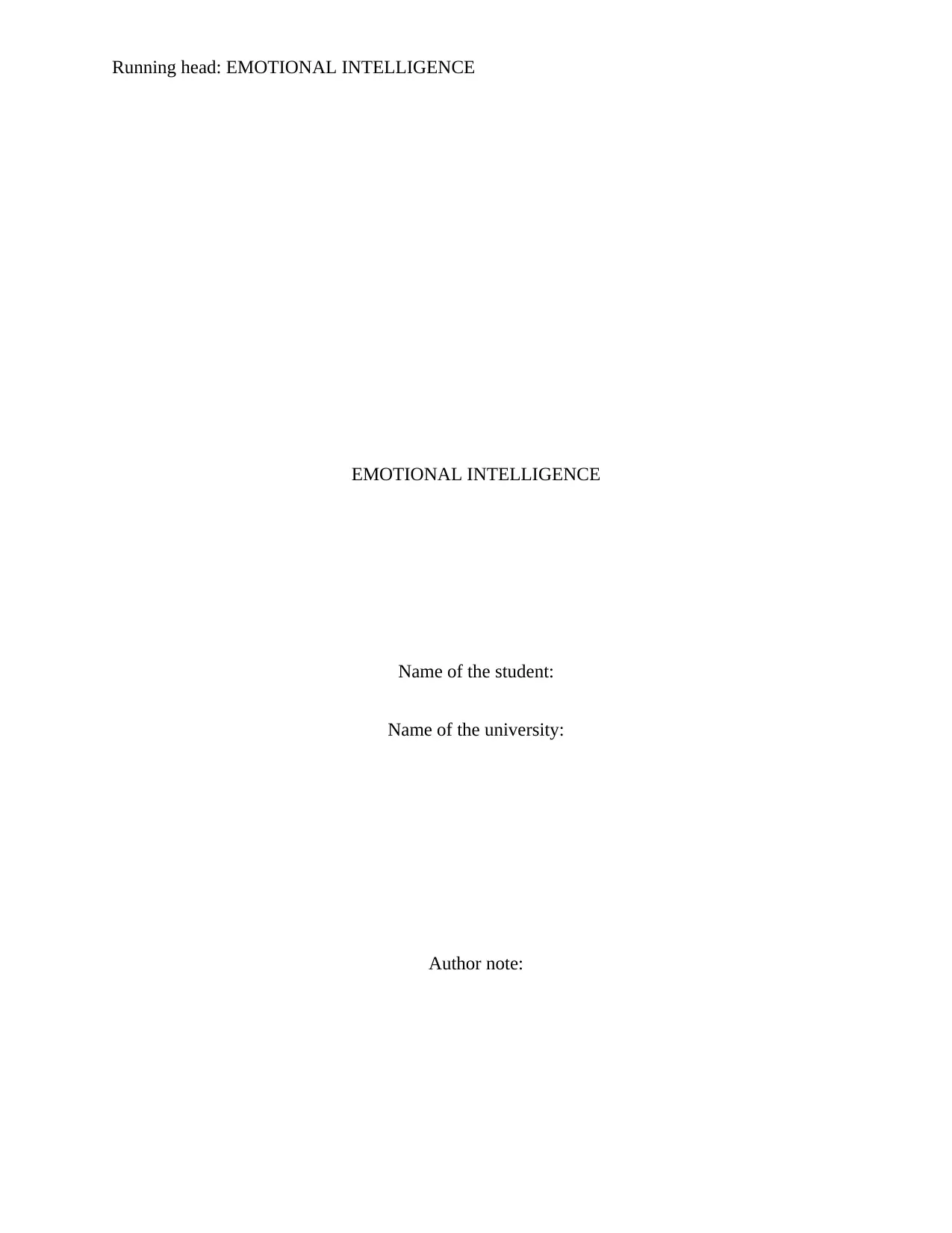
Running head: EMOTIONAL INTELLIGENCE
EMOTIONAL INTELLIGENCE
Name of the student:
Name of the university:
Author note:
EMOTIONAL INTELLIGENCE
Name of the student:
Name of the university:
Author note:
Secure Best Marks with AI Grader
Need help grading? Try our AI Grader for instant feedback on your assignments.
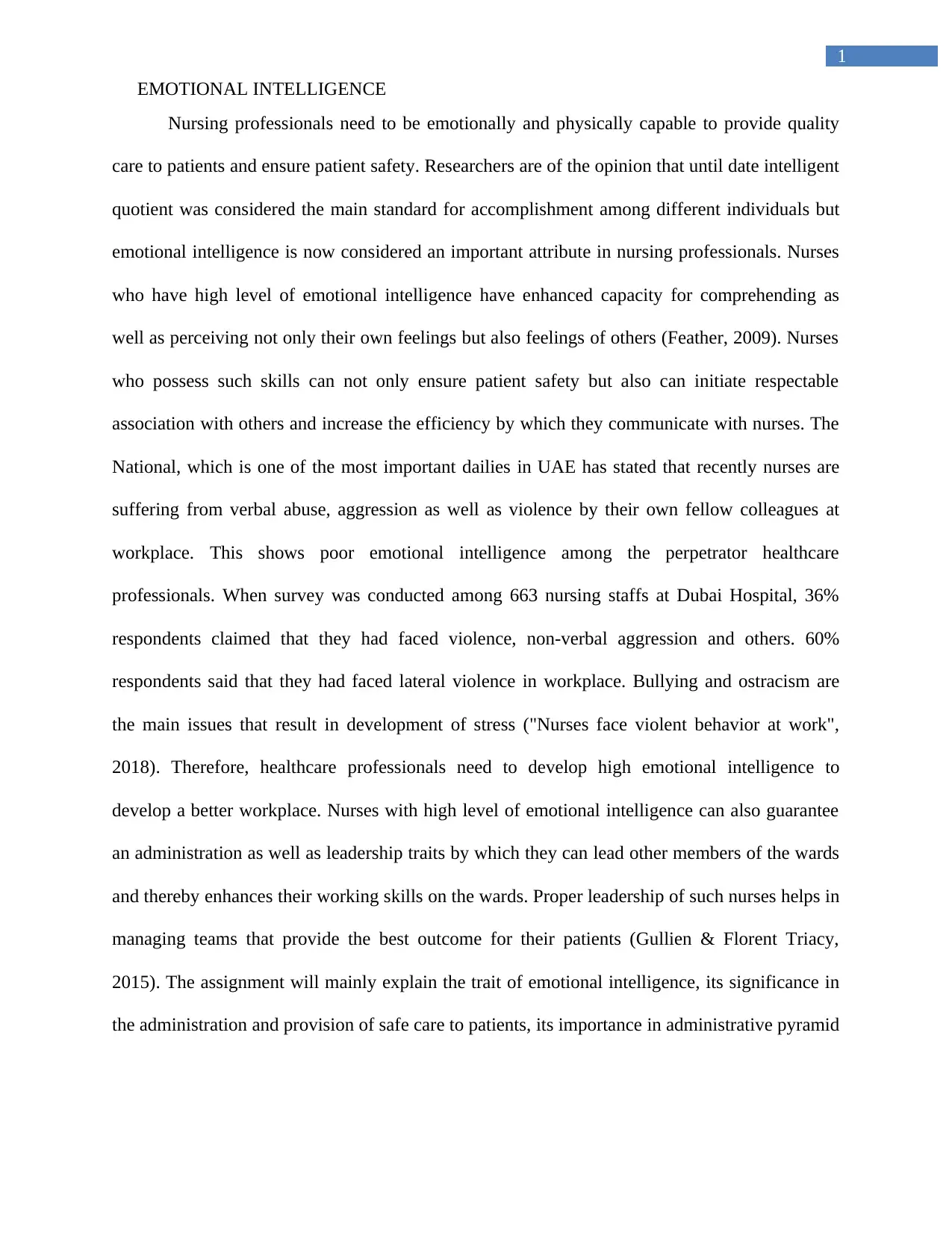
1
EMOTIONAL INTELLIGENCE
Nursing professionals need to be emotionally and physically capable to provide quality
care to patients and ensure patient safety. Researchers are of the opinion that until date intelligent
quotient was considered the main standard for accomplishment among different individuals but
emotional intelligence is now considered an important attribute in nursing professionals. Nurses
who have high level of emotional intelligence have enhanced capacity for comprehending as
well as perceiving not only their own feelings but also feelings of others (Feather, 2009). Nurses
who possess such skills can not only ensure patient safety but also can initiate respectable
association with others and increase the efficiency by which they communicate with nurses. The
National, which is one of the most important dailies in UAE has stated that recently nurses are
suffering from verbal abuse, aggression as well as violence by their own fellow colleagues at
workplace. This shows poor emotional intelligence among the perpetrator healthcare
professionals. When survey was conducted among 663 nursing staffs at Dubai Hospital, 36%
respondents claimed that they had faced violence, non-verbal aggression and others. 60%
respondents said that they had faced lateral violence in workplace. Bullying and ostracism are
the main issues that result in development of stress ("Nurses face violent behavior at work",
2018). Therefore, healthcare professionals need to develop high emotional intelligence to
develop a better workplace. Nurses with high level of emotional intelligence can also guarantee
an administration as well as leadership traits by which they can lead other members of the wards
and thereby enhances their working skills on the wards. Proper leadership of such nurses helps in
managing teams that provide the best outcome for their patients (Gullien & Florent Triacy,
2015). The assignment will mainly explain the trait of emotional intelligence, its significance in
the administration and provision of safe care to patients, its importance in administrative pyramid
EMOTIONAL INTELLIGENCE
Nursing professionals need to be emotionally and physically capable to provide quality
care to patients and ensure patient safety. Researchers are of the opinion that until date intelligent
quotient was considered the main standard for accomplishment among different individuals but
emotional intelligence is now considered an important attribute in nursing professionals. Nurses
who have high level of emotional intelligence have enhanced capacity for comprehending as
well as perceiving not only their own feelings but also feelings of others (Feather, 2009). Nurses
who possess such skills can not only ensure patient safety but also can initiate respectable
association with others and increase the efficiency by which they communicate with nurses. The
National, which is one of the most important dailies in UAE has stated that recently nurses are
suffering from verbal abuse, aggression as well as violence by their own fellow colleagues at
workplace. This shows poor emotional intelligence among the perpetrator healthcare
professionals. When survey was conducted among 663 nursing staffs at Dubai Hospital, 36%
respondents claimed that they had faced violence, non-verbal aggression and others. 60%
respondents said that they had faced lateral violence in workplace. Bullying and ostracism are
the main issues that result in development of stress ("Nurses face violent behavior at work",
2018). Therefore, healthcare professionals need to develop high emotional intelligence to
develop a better workplace. Nurses with high level of emotional intelligence can also guarantee
an administration as well as leadership traits by which they can lead other members of the wards
and thereby enhances their working skills on the wards. Proper leadership of such nurses helps in
managing teams that provide the best outcome for their patients (Gullien & Florent Triacy,
2015). The assignment will mainly explain the trait of emotional intelligence, its significance in
the administration and provision of safe care to patients, its importance in administrative pyramid
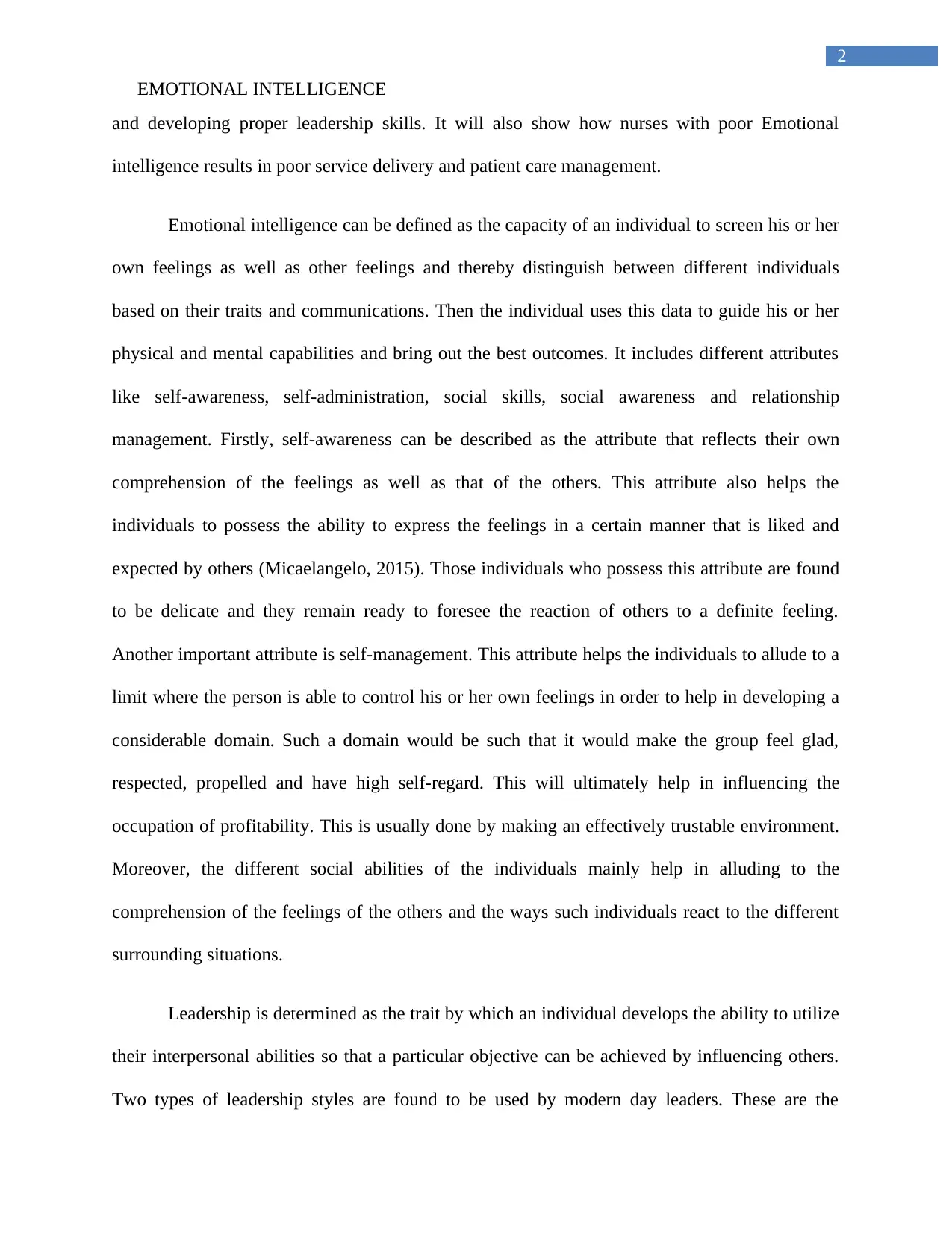
2
EMOTIONAL INTELLIGENCE
and developing proper leadership skills. It will also show how nurses with poor Emotional
intelligence results in poor service delivery and patient care management.
Emotional intelligence can be defined as the capacity of an individual to screen his or her
own feelings as well as other feelings and thereby distinguish between different individuals
based on their traits and communications. Then the individual uses this data to guide his or her
physical and mental capabilities and bring out the best outcomes. It includes different attributes
like self-awareness, self-administration, social skills, social awareness and relationship
management. Firstly, self-awareness can be described as the attribute that reflects their own
comprehension of the feelings as well as that of the others. This attribute also helps the
individuals to possess the ability to express the feelings in a certain manner that is liked and
expected by others (Micaelangelo, 2015). Those individuals who possess this attribute are found
to be delicate and they remain ready to foresee the reaction of others to a definite feeling.
Another important attribute is self-management. This attribute helps the individuals to allude to a
limit where the person is able to control his or her own feelings in order to help in developing a
considerable domain. Such a domain would be such that it would make the group feel glad,
respected, propelled and have high self-regard. This will ultimately help in influencing the
occupation of profitability. This is usually done by making an effectively trustable environment.
Moreover, the different social abilities of the individuals mainly help in alluding to the
comprehension of the feelings of the others and the ways such individuals react to the different
surrounding situations.
Leadership is determined as the trait by which an individual develops the ability to utilize
their interpersonal abilities so that a particular objective can be achieved by influencing others.
Two types of leadership styles are found to be used by modern day leaders. These are the
EMOTIONAL INTELLIGENCE
and developing proper leadership skills. It will also show how nurses with poor Emotional
intelligence results in poor service delivery and patient care management.
Emotional intelligence can be defined as the capacity of an individual to screen his or her
own feelings as well as other feelings and thereby distinguish between different individuals
based on their traits and communications. Then the individual uses this data to guide his or her
physical and mental capabilities and bring out the best outcomes. It includes different attributes
like self-awareness, self-administration, social skills, social awareness and relationship
management. Firstly, self-awareness can be described as the attribute that reflects their own
comprehension of the feelings as well as that of the others. This attribute also helps the
individuals to possess the ability to express the feelings in a certain manner that is liked and
expected by others (Micaelangelo, 2015). Those individuals who possess this attribute are found
to be delicate and they remain ready to foresee the reaction of others to a definite feeling.
Another important attribute is self-management. This attribute helps the individuals to allude to a
limit where the person is able to control his or her own feelings in order to help in developing a
considerable domain. Such a domain would be such that it would make the group feel glad,
respected, propelled and have high self-regard. This will ultimately help in influencing the
occupation of profitability. This is usually done by making an effectively trustable environment.
Moreover, the different social abilities of the individuals mainly help in alluding to the
comprehension of the feelings of the others and the ways such individuals react to the different
surrounding situations.
Leadership is determined as the trait by which an individual develops the ability to utilize
their interpersonal abilities so that a particular objective can be achieved by influencing others.
Two types of leadership styles are found to be used by modern day leaders. These are the
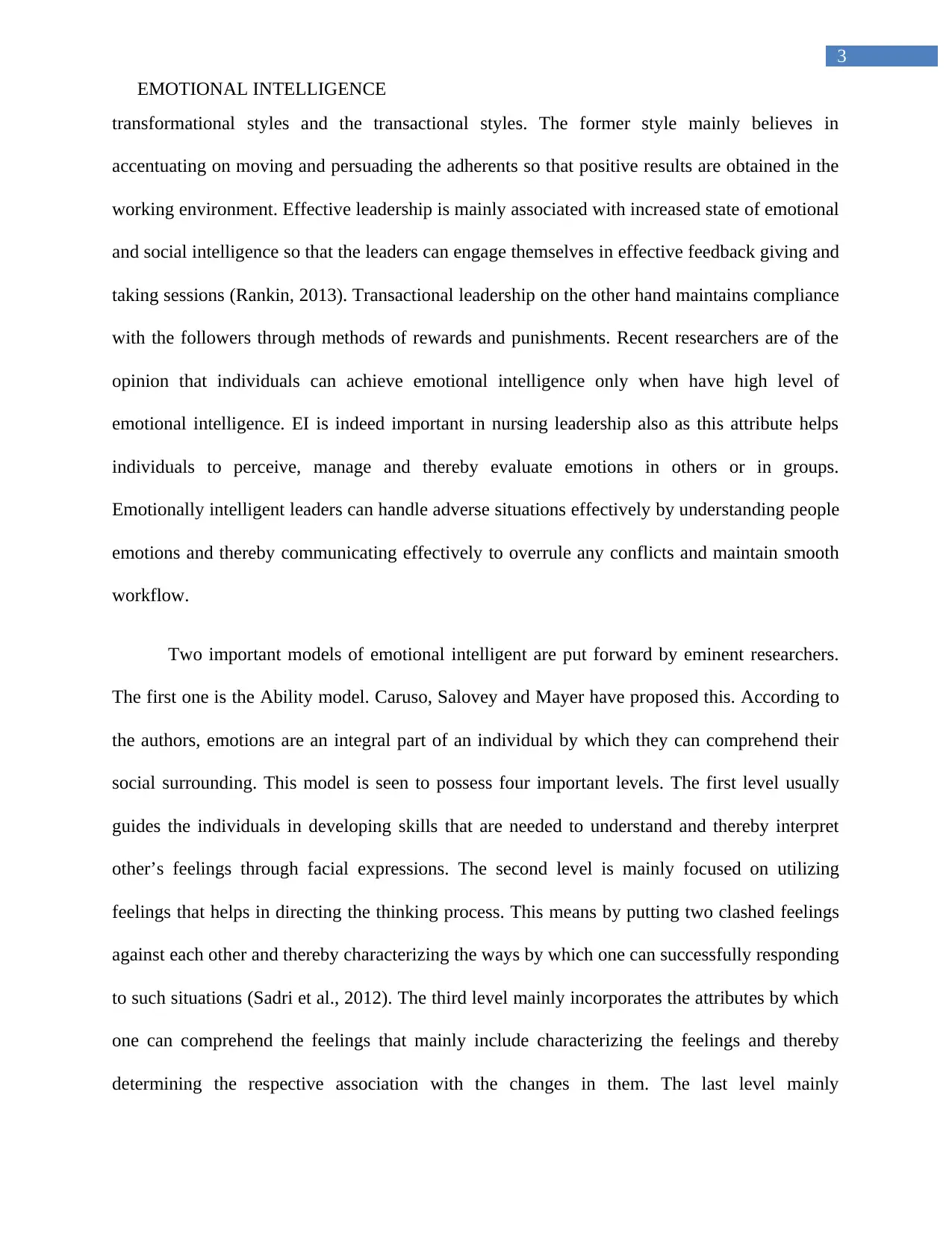
3
EMOTIONAL INTELLIGENCE
transformational styles and the transactional styles. The former style mainly believes in
accentuating on moving and persuading the adherents so that positive results are obtained in the
working environment. Effective leadership is mainly associated with increased state of emotional
and social intelligence so that the leaders can engage themselves in effective feedback giving and
taking sessions (Rankin, 2013). Transactional leadership on the other hand maintains compliance
with the followers through methods of rewards and punishments. Recent researchers are of the
opinion that individuals can achieve emotional intelligence only when have high level of
emotional intelligence. EI is indeed important in nursing leadership also as this attribute helps
individuals to perceive, manage and thereby evaluate emotions in others or in groups.
Emotionally intelligent leaders can handle adverse situations effectively by understanding people
emotions and thereby communicating effectively to overrule any conflicts and maintain smooth
workflow.
Two important models of emotional intelligent are put forward by eminent researchers.
The first one is the Ability model. Caruso, Salovey and Mayer have proposed this. According to
the authors, emotions are an integral part of an individual by which they can comprehend their
social surrounding. This model is seen to possess four important levels. The first level usually
guides the individuals in developing skills that are needed to understand and thereby interpret
other’s feelings through facial expressions. The second level is mainly focused on utilizing
feelings that helps in directing the thinking process. This means by putting two clashed feelings
against each other and thereby characterizing the ways by which one can successfully responding
to such situations (Sadri et al., 2012). The third level mainly incorporates the attributes by which
one can comprehend the feelings that mainly include characterizing the feelings and thereby
determining the respective association with the changes in them. The last level mainly
EMOTIONAL INTELLIGENCE
transformational styles and the transactional styles. The former style mainly believes in
accentuating on moving and persuading the adherents so that positive results are obtained in the
working environment. Effective leadership is mainly associated with increased state of emotional
and social intelligence so that the leaders can engage themselves in effective feedback giving and
taking sessions (Rankin, 2013). Transactional leadership on the other hand maintains compliance
with the followers through methods of rewards and punishments. Recent researchers are of the
opinion that individuals can achieve emotional intelligence only when have high level of
emotional intelligence. EI is indeed important in nursing leadership also as this attribute helps
individuals to perceive, manage and thereby evaluate emotions in others or in groups.
Emotionally intelligent leaders can handle adverse situations effectively by understanding people
emotions and thereby communicating effectively to overrule any conflicts and maintain smooth
workflow.
Two important models of emotional intelligent are put forward by eminent researchers.
The first one is the Ability model. Caruso, Salovey and Mayer have proposed this. According to
the authors, emotions are an integral part of an individual by which they can comprehend their
social surrounding. This model is seen to possess four important levels. The first level usually
guides the individuals in developing skills that are needed to understand and thereby interpret
other’s feelings through facial expressions. The second level is mainly focused on utilizing
feelings that helps in directing the thinking process. This means by putting two clashed feelings
against each other and thereby characterizing the ways by which one can successfully responding
to such situations (Sadri et al., 2012). The third level mainly incorporates the attributes by which
one can comprehend the feelings that mainly include characterizing the feelings and thereby
determining the respective association with the changes in them. The last level mainly
Secure Best Marks with AI Grader
Need help grading? Try our AI Grader for instant feedback on your assignments.
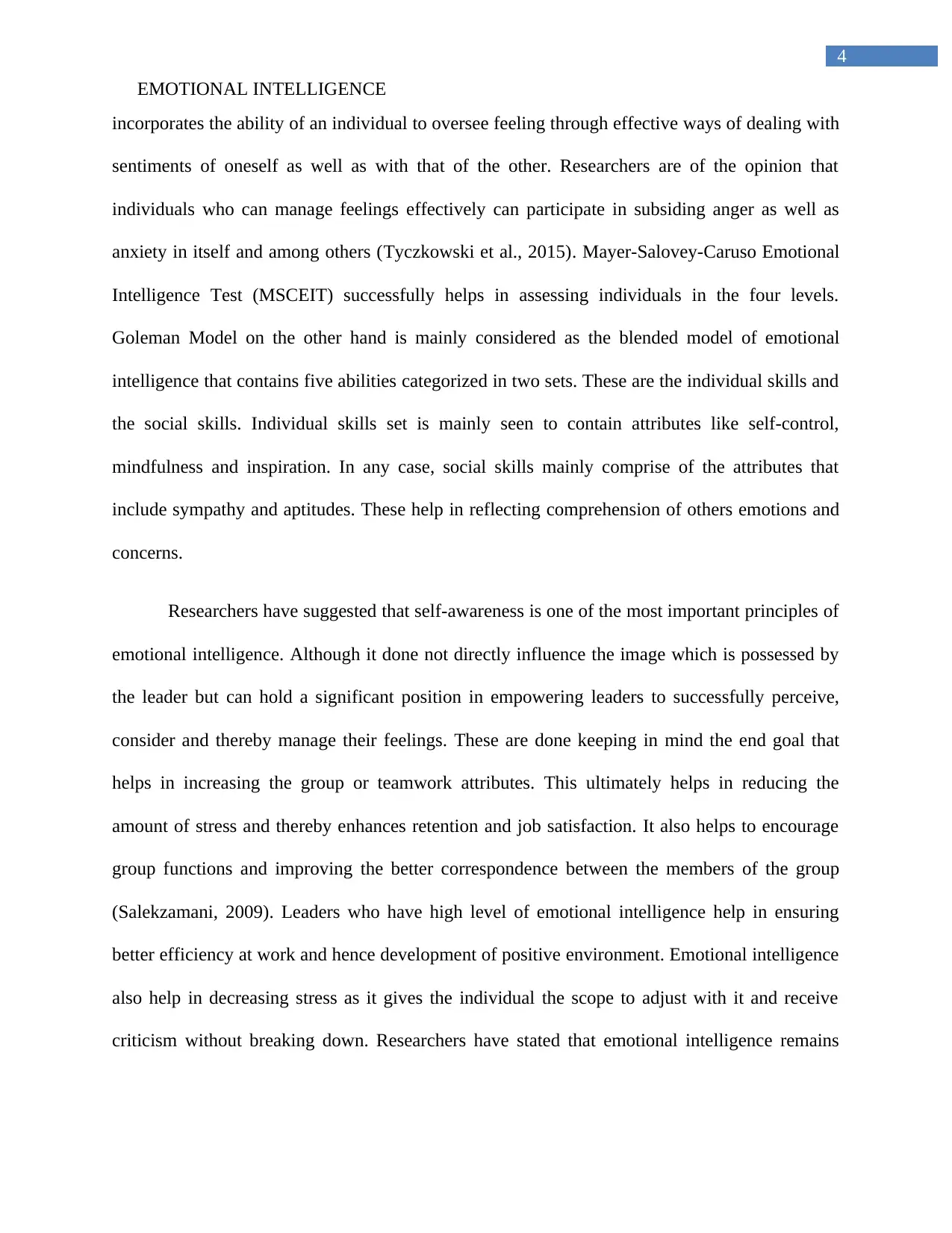
4
EMOTIONAL INTELLIGENCE
incorporates the ability of an individual to oversee feeling through effective ways of dealing with
sentiments of oneself as well as with that of the other. Researchers are of the opinion that
individuals who can manage feelings effectively can participate in subsiding anger as well as
anxiety in itself and among others (Tyczkowski et al., 2015). Mayer-Salovey-Caruso Emotional
Intelligence Test (MSCEIT) successfully helps in assessing individuals in the four levels.
Goleman Model on the other hand is mainly considered as the blended model of emotional
intelligence that contains five abilities categorized in two sets. These are the individual skills and
the social skills. Individual skills set is mainly seen to contain attributes like self-control,
mindfulness and inspiration. In any case, social skills mainly comprise of the attributes that
include sympathy and aptitudes. These help in reflecting comprehension of others emotions and
concerns.
Researchers have suggested that self-awareness is one of the most important principles of
emotional intelligence. Although it done not directly influence the image which is possessed by
the leader but can hold a significant position in empowering leaders to successfully perceive,
consider and thereby manage their feelings. These are done keeping in mind the end goal that
helps in increasing the group or teamwork attributes. This ultimately helps in reducing the
amount of stress and thereby enhances retention and job satisfaction. It also helps to encourage
group functions and improving the better correspondence between the members of the group
(Salekzamani, 2009). Leaders who have high level of emotional intelligence help in ensuring
better efficiency at work and hence development of positive environment. Emotional intelligence
also help in decreasing stress as it gives the individual the scope to adjust with it and receive
criticism without breaking down. Researchers have stated that emotional intelligence remains
EMOTIONAL INTELLIGENCE
incorporates the ability of an individual to oversee feeling through effective ways of dealing with
sentiments of oneself as well as with that of the other. Researchers are of the opinion that
individuals who can manage feelings effectively can participate in subsiding anger as well as
anxiety in itself and among others (Tyczkowski et al., 2015). Mayer-Salovey-Caruso Emotional
Intelligence Test (MSCEIT) successfully helps in assessing individuals in the four levels.
Goleman Model on the other hand is mainly considered as the blended model of emotional
intelligence that contains five abilities categorized in two sets. These are the individual skills and
the social skills. Individual skills set is mainly seen to contain attributes like self-control,
mindfulness and inspiration. In any case, social skills mainly comprise of the attributes that
include sympathy and aptitudes. These help in reflecting comprehension of others emotions and
concerns.
Researchers have suggested that self-awareness is one of the most important principles of
emotional intelligence. Although it done not directly influence the image which is possessed by
the leader but can hold a significant position in empowering leaders to successfully perceive,
consider and thereby manage their feelings. These are done keeping in mind the end goal that
helps in increasing the group or teamwork attributes. This ultimately helps in reducing the
amount of stress and thereby enhances retention and job satisfaction. It also helps to encourage
group functions and improving the better correspondence between the members of the group
(Salekzamani, 2009). Leaders who have high level of emotional intelligence help in ensuring
better efficiency at work and hence development of positive environment. Emotional intelligence
also help in decreasing stress as it gives the individual the scope to adjust with it and receive
criticism without breaking down. Researchers have stated that emotional intelligence remains
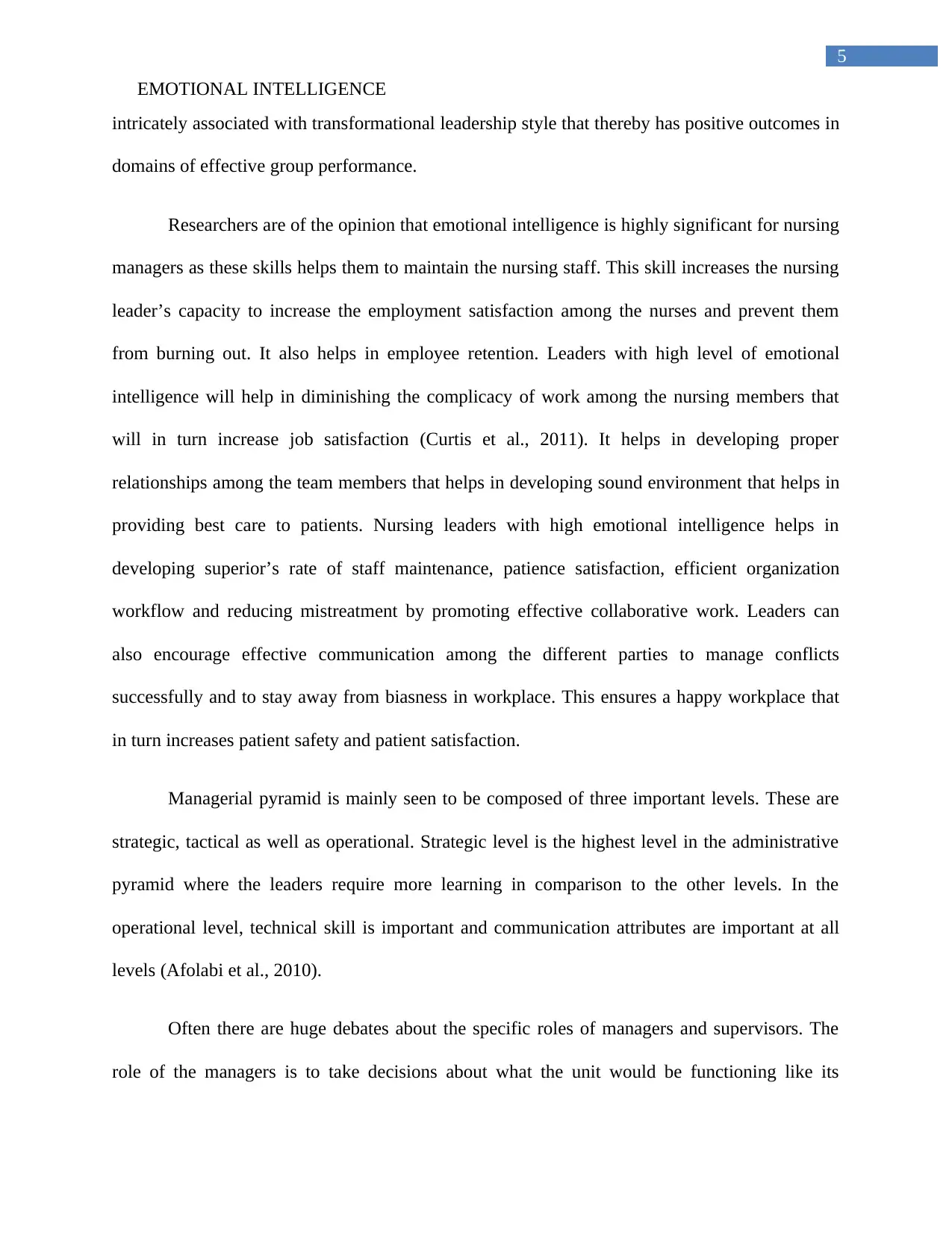
5
EMOTIONAL INTELLIGENCE
intricately associated with transformational leadership style that thereby has positive outcomes in
domains of effective group performance.
Researchers are of the opinion that emotional intelligence is highly significant for nursing
managers as these skills helps them to maintain the nursing staff. This skill increases the nursing
leader’s capacity to increase the employment satisfaction among the nurses and prevent them
from burning out. It also helps in employee retention. Leaders with high level of emotional
intelligence will help in diminishing the complicacy of work among the nursing members that
will in turn increase job satisfaction (Curtis et al., 2011). It helps in developing proper
relationships among the team members that helps in developing sound environment that helps in
providing best care to patients. Nursing leaders with high emotional intelligence helps in
developing superior’s rate of staff maintenance, patience satisfaction, efficient organization
workflow and reducing mistreatment by promoting effective collaborative work. Leaders can
also encourage effective communication among the different parties to manage conflicts
successfully and to stay away from biasness in workplace. This ensures a happy workplace that
in turn increases patient safety and patient satisfaction.
Managerial pyramid is mainly seen to be composed of three important levels. These are
strategic, tactical as well as operational. Strategic level is the highest level in the administrative
pyramid where the leaders require more learning in comparison to the other levels. In the
operational level, technical skill is important and communication attributes are important at all
levels (Afolabi et al., 2010).
Often there are huge debates about the specific roles of managers and supervisors. The
role of the managers is to take decisions about what the unit would be functioning like its
EMOTIONAL INTELLIGENCE
intricately associated with transformational leadership style that thereby has positive outcomes in
domains of effective group performance.
Researchers are of the opinion that emotional intelligence is highly significant for nursing
managers as these skills helps them to maintain the nursing staff. This skill increases the nursing
leader’s capacity to increase the employment satisfaction among the nurses and prevent them
from burning out. It also helps in employee retention. Leaders with high level of emotional
intelligence will help in diminishing the complicacy of work among the nursing members that
will in turn increase job satisfaction (Curtis et al., 2011). It helps in developing proper
relationships among the team members that helps in developing sound environment that helps in
providing best care to patients. Nursing leaders with high emotional intelligence helps in
developing superior’s rate of staff maintenance, patience satisfaction, efficient organization
workflow and reducing mistreatment by promoting effective collaborative work. Leaders can
also encourage effective communication among the different parties to manage conflicts
successfully and to stay away from biasness in workplace. This ensures a happy workplace that
in turn increases patient safety and patient satisfaction.
Managerial pyramid is mainly seen to be composed of three important levels. These are
strategic, tactical as well as operational. Strategic level is the highest level in the administrative
pyramid where the leaders require more learning in comparison to the other levels. In the
operational level, technical skill is important and communication attributes are important at all
levels (Afolabi et al., 2010).
Often there are huge debates about the specific roles of managers and supervisors. The
role of the managers is to take decisions about what the unit would be functioning like its
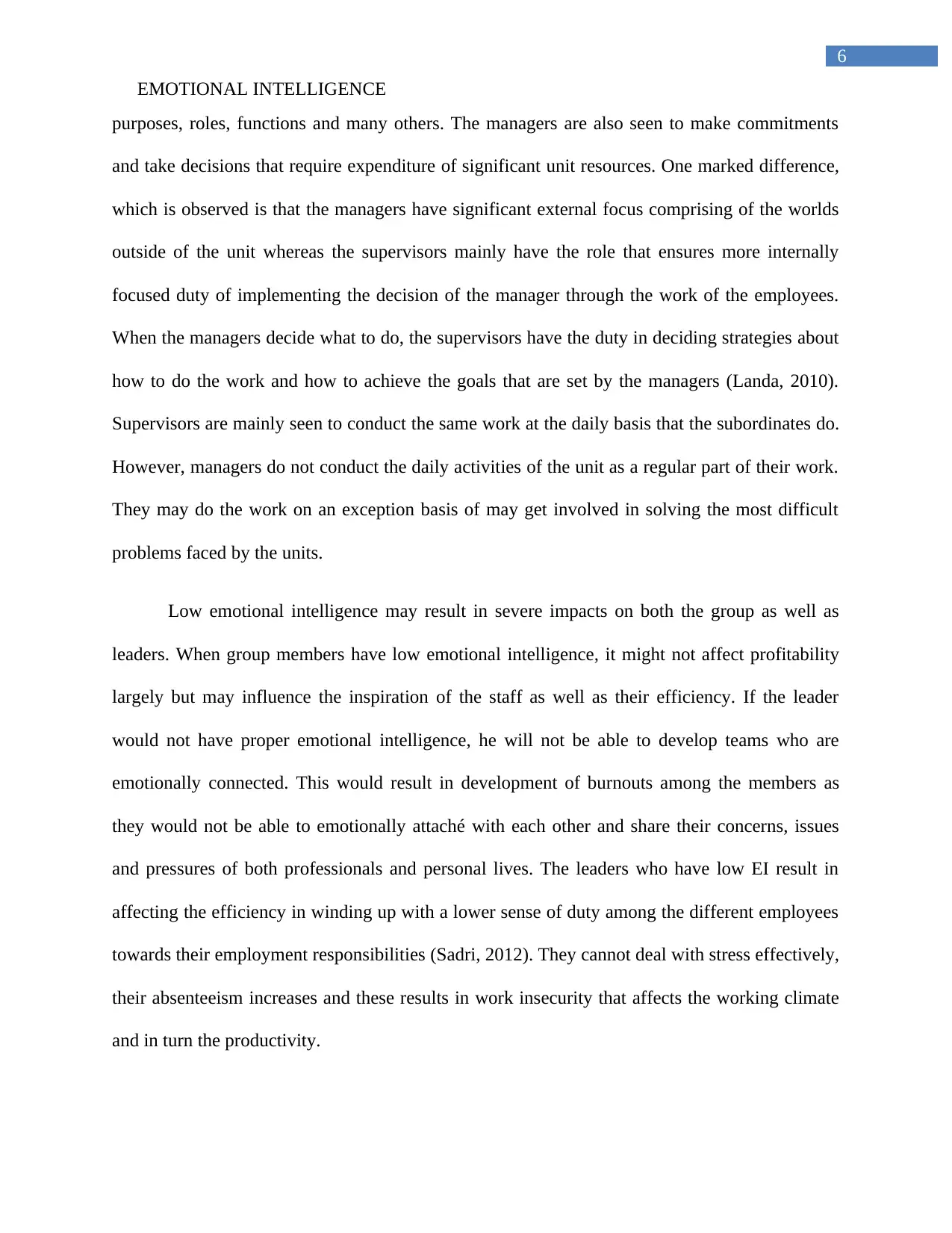
6
EMOTIONAL INTELLIGENCE
purposes, roles, functions and many others. The managers are also seen to make commitments
and take decisions that require expenditure of significant unit resources. One marked difference,
which is observed is that the managers have significant external focus comprising of the worlds
outside of the unit whereas the supervisors mainly have the role that ensures more internally
focused duty of implementing the decision of the manager through the work of the employees.
When the managers decide what to do, the supervisors have the duty in deciding strategies about
how to do the work and how to achieve the goals that are set by the managers (Landa, 2010).
Supervisors are mainly seen to conduct the same work at the daily basis that the subordinates do.
However, managers do not conduct the daily activities of the unit as a regular part of their work.
They may do the work on an exception basis of may get involved in solving the most difficult
problems faced by the units.
Low emotional intelligence may result in severe impacts on both the group as well as
leaders. When group members have low emotional intelligence, it might not affect profitability
largely but may influence the inspiration of the staff as well as their efficiency. If the leader
would not have proper emotional intelligence, he will not be able to develop teams who are
emotionally connected. This would result in development of burnouts among the members as
they would not be able to emotionally attaché with each other and share their concerns, issues
and pressures of both professionals and personal lives. The leaders who have low EI result in
affecting the efficiency in winding up with a lower sense of duty among the different employees
towards their employment responsibilities (Sadri, 2012). They cannot deal with stress effectively,
their absenteeism increases and these results in work insecurity that affects the working climate
and in turn the productivity.
EMOTIONAL INTELLIGENCE
purposes, roles, functions and many others. The managers are also seen to make commitments
and take decisions that require expenditure of significant unit resources. One marked difference,
which is observed is that the managers have significant external focus comprising of the worlds
outside of the unit whereas the supervisors mainly have the role that ensures more internally
focused duty of implementing the decision of the manager through the work of the employees.
When the managers decide what to do, the supervisors have the duty in deciding strategies about
how to do the work and how to achieve the goals that are set by the managers (Landa, 2010).
Supervisors are mainly seen to conduct the same work at the daily basis that the subordinates do.
However, managers do not conduct the daily activities of the unit as a regular part of their work.
They may do the work on an exception basis of may get involved in solving the most difficult
problems faced by the units.
Low emotional intelligence may result in severe impacts on both the group as well as
leaders. When group members have low emotional intelligence, it might not affect profitability
largely but may influence the inspiration of the staff as well as their efficiency. If the leader
would not have proper emotional intelligence, he will not be able to develop teams who are
emotionally connected. This would result in development of burnouts among the members as
they would not be able to emotionally attaché with each other and share their concerns, issues
and pressures of both professionals and personal lives. The leaders who have low EI result in
affecting the efficiency in winding up with a lower sense of duty among the different employees
towards their employment responsibilities (Sadri, 2012). They cannot deal with stress effectively,
their absenteeism increases and these results in work insecurity that affects the working climate
and in turn the productivity.
Paraphrase This Document
Need a fresh take? Get an instant paraphrase of this document with our AI Paraphraser
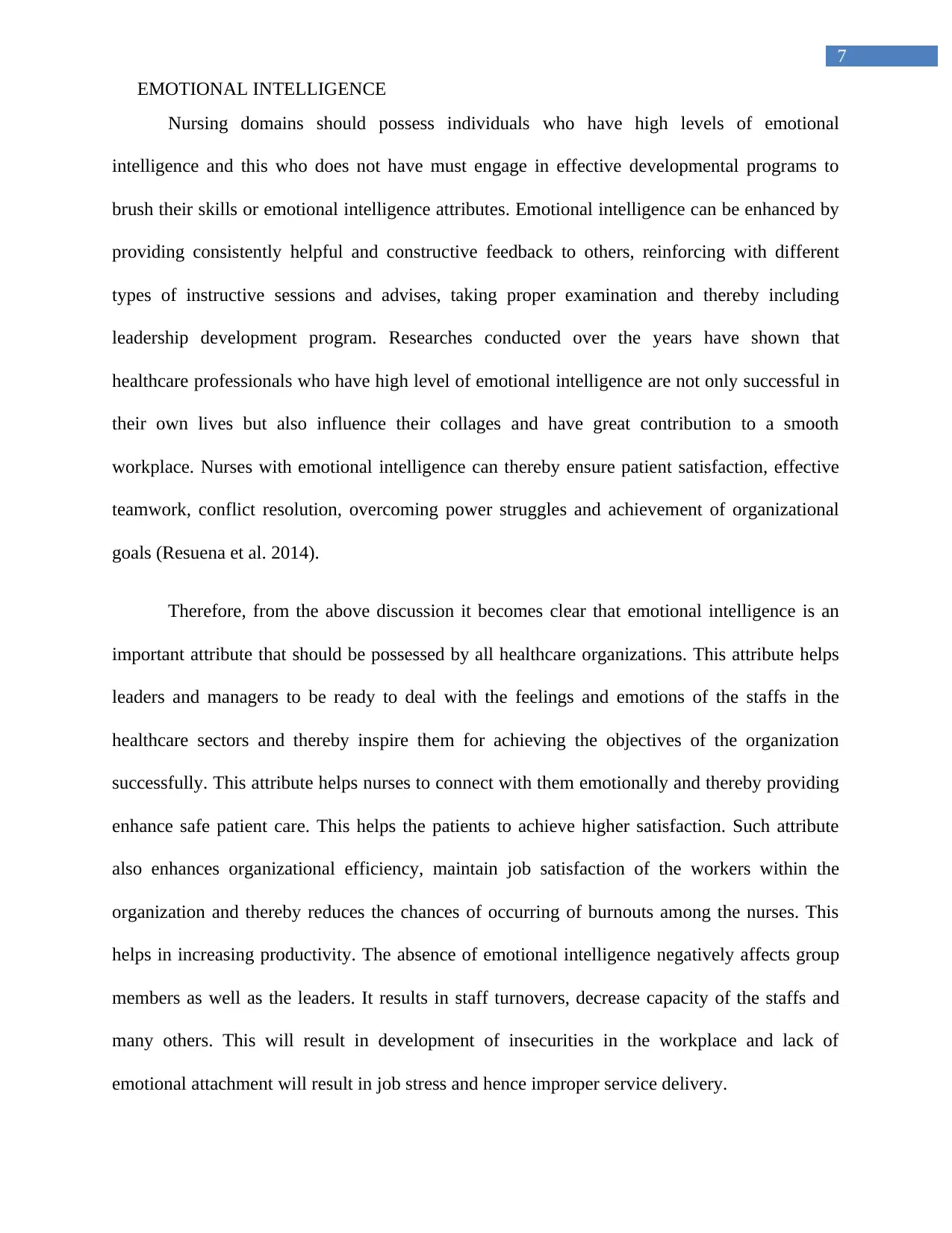
7
EMOTIONAL INTELLIGENCE
Nursing domains should possess individuals who have high levels of emotional
intelligence and this who does not have must engage in effective developmental programs to
brush their skills or emotional intelligence attributes. Emotional intelligence can be enhanced by
providing consistently helpful and constructive feedback to others, reinforcing with different
types of instructive sessions and advises, taking proper examination and thereby including
leadership development program. Researches conducted over the years have shown that
healthcare professionals who have high level of emotional intelligence are not only successful in
their own lives but also influence their collages and have great contribution to a smooth
workplace. Nurses with emotional intelligence can thereby ensure patient satisfaction, effective
teamwork, conflict resolution, overcoming power struggles and achievement of organizational
goals (Resuena et al. 2014).
Therefore, from the above discussion it becomes clear that emotional intelligence is an
important attribute that should be possessed by all healthcare organizations. This attribute helps
leaders and managers to be ready to deal with the feelings and emotions of the staffs in the
healthcare sectors and thereby inspire them for achieving the objectives of the organization
successfully. This attribute helps nurses to connect with them emotionally and thereby providing
enhance safe patient care. This helps the patients to achieve higher satisfaction. Such attribute
also enhances organizational efficiency, maintain job satisfaction of the workers within the
organization and thereby reduces the chances of occurring of burnouts among the nurses. This
helps in increasing productivity. The absence of emotional intelligence negatively affects group
members as well as the leaders. It results in staff turnovers, decrease capacity of the staffs and
many others. This will result in development of insecurities in the workplace and lack of
emotional attachment will result in job stress and hence improper service delivery.
EMOTIONAL INTELLIGENCE
Nursing domains should possess individuals who have high levels of emotional
intelligence and this who does not have must engage in effective developmental programs to
brush their skills or emotional intelligence attributes. Emotional intelligence can be enhanced by
providing consistently helpful and constructive feedback to others, reinforcing with different
types of instructive sessions and advises, taking proper examination and thereby including
leadership development program. Researches conducted over the years have shown that
healthcare professionals who have high level of emotional intelligence are not only successful in
their own lives but also influence their collages and have great contribution to a smooth
workplace. Nurses with emotional intelligence can thereby ensure patient satisfaction, effective
teamwork, conflict resolution, overcoming power struggles and achievement of organizational
goals (Resuena et al. 2014).
Therefore, from the above discussion it becomes clear that emotional intelligence is an
important attribute that should be possessed by all healthcare organizations. This attribute helps
leaders and managers to be ready to deal with the feelings and emotions of the staffs in the
healthcare sectors and thereby inspire them for achieving the objectives of the organization
successfully. This attribute helps nurses to connect with them emotionally and thereby providing
enhance safe patient care. This helps the patients to achieve higher satisfaction. Such attribute
also enhances organizational efficiency, maintain job satisfaction of the workers within the
organization and thereby reduces the chances of occurring of burnouts among the nurses. This
helps in increasing productivity. The absence of emotional intelligence negatively affects group
members as well as the leaders. It results in staff turnovers, decrease capacity of the staffs and
many others. This will result in development of insecurities in the workplace and lack of
emotional attachment will result in job stress and hence improper service delivery.
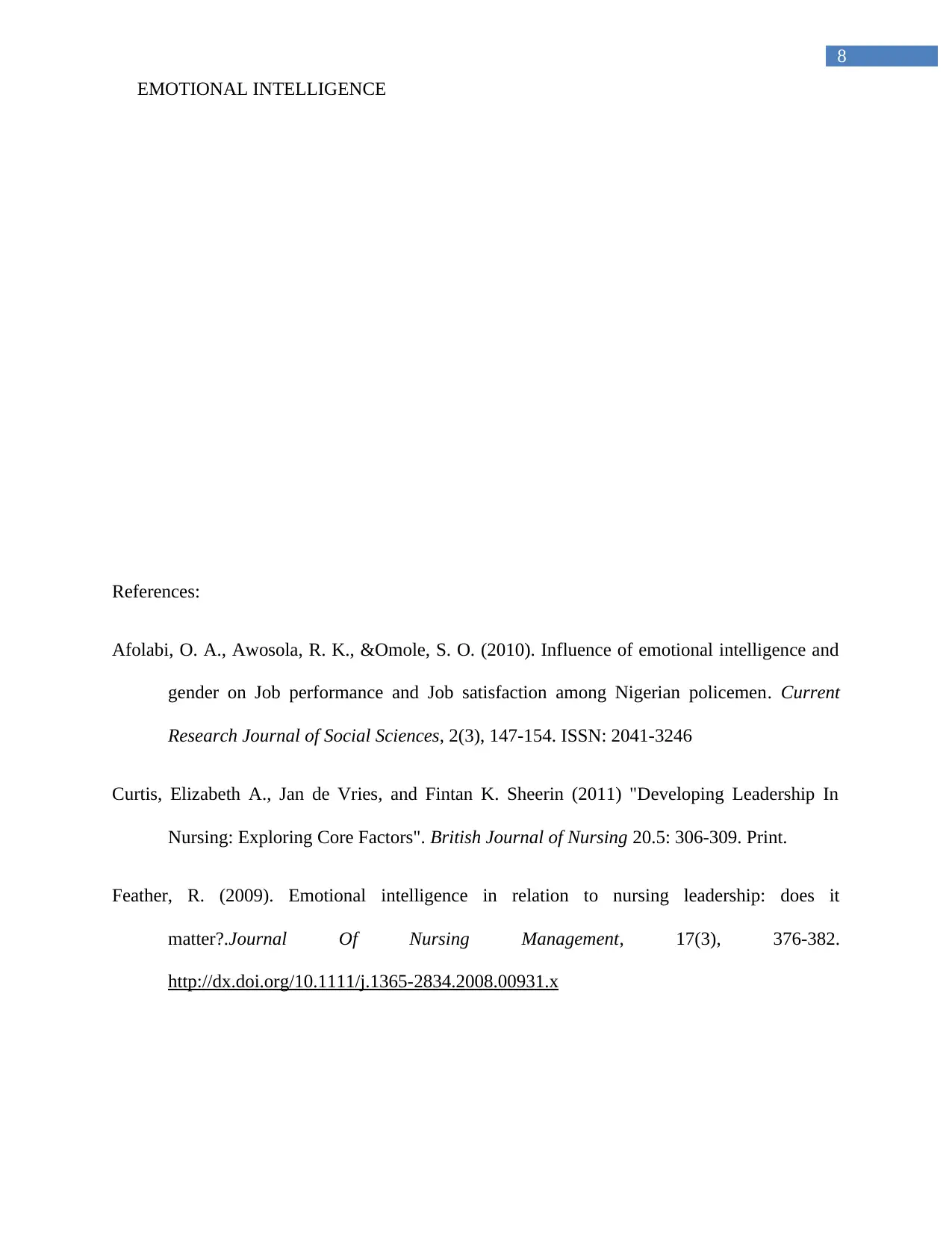
8
EMOTIONAL INTELLIGENCE
References:
Afolabi, O. A., Awosola, R. K., &Omole, S. O. (2010). Influence of emotional intelligence and
gender on Job performance and Job satisfaction among Nigerian policemen. Current
Research Journal of Social Sciences, 2(3), 147-154. ISSN: 2041-3246
Curtis, Elizabeth A., Jan de Vries, and Fintan K. Sheerin (2011) "Developing Leadership In
Nursing: Exploring Core Factors". British Journal of Nursing 20.5: 306-309. Print.
Feather, R. (2009). Emotional intelligence in relation to nursing leadership: does it
matter?.Journal Of Nursing Management, 17(3), 376-382.
http://dx.doi.org/10.1111/j.1365-2834.2008.00931.x
EMOTIONAL INTELLIGENCE
References:
Afolabi, O. A., Awosola, R. K., &Omole, S. O. (2010). Influence of emotional intelligence and
gender on Job performance and Job satisfaction among Nigerian policemen. Current
Research Journal of Social Sciences, 2(3), 147-154. ISSN: 2041-3246
Curtis, Elizabeth A., Jan de Vries, and Fintan K. Sheerin (2011) "Developing Leadership In
Nursing: Exploring Core Factors". British Journal of Nursing 20.5: 306-309. Print.
Feather, R. (2009). Emotional intelligence in relation to nursing leadership: does it
matter?.Journal Of Nursing Management, 17(3), 376-382.
http://dx.doi.org/10.1111/j.1365-2834.2008.00931.x
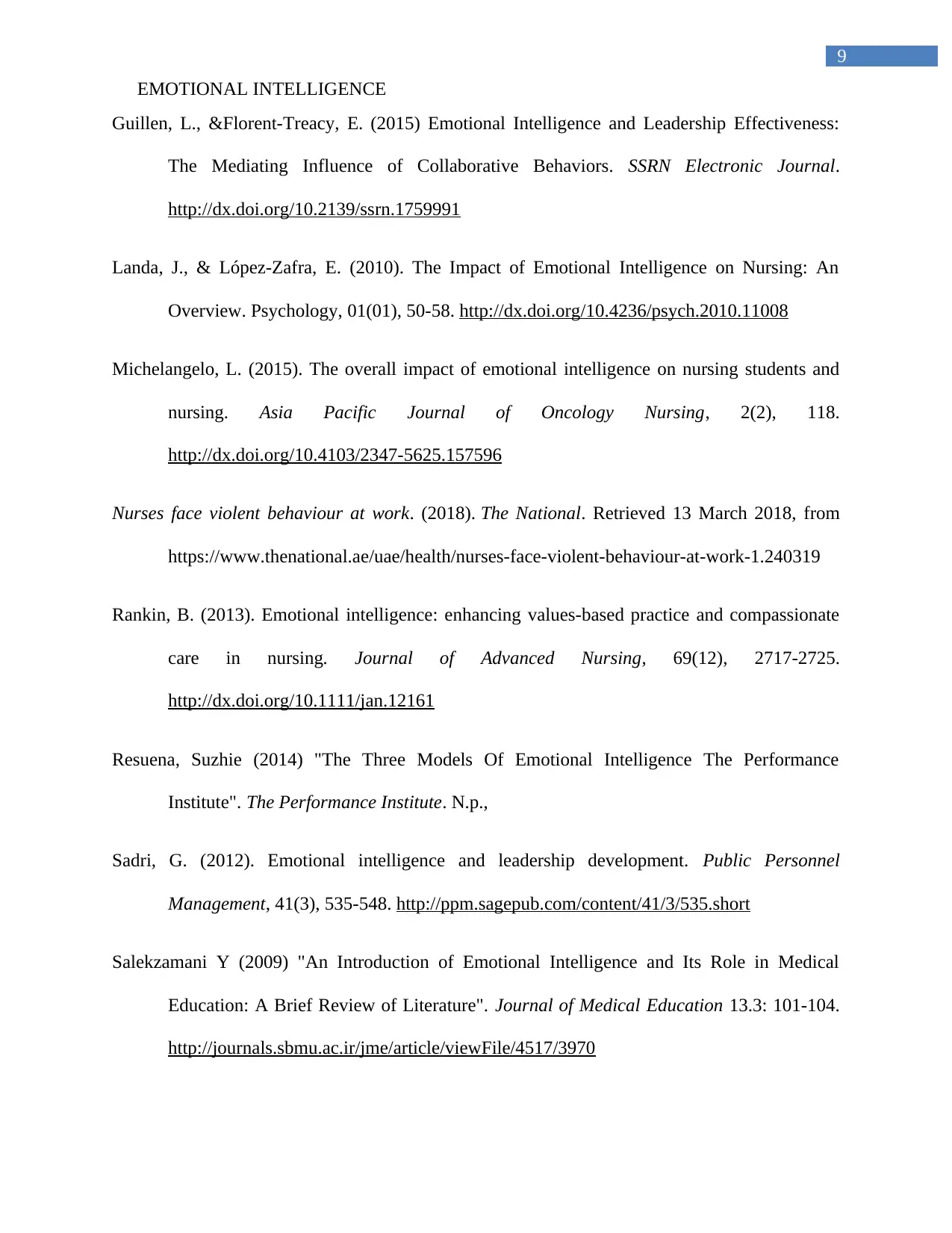
9
EMOTIONAL INTELLIGENCE
Guillen, L., &Florent-Treacy, E. (2015) Emotional Intelligence and Leadership Effectiveness:
The Mediating Influence of Collaborative Behaviors. SSRN Electronic Journal.
http://dx.doi.org/10.2139/ssrn.1759991
Landa, J., & López-Zafra, E. (2010). The Impact of Emotional Intelligence on Nursing: An
Overview. Psychology, 01(01), 50-58. http://dx.doi.org/10.4236/psych.2010.11008
Michelangelo, L. (2015). The overall impact of emotional intelligence on nursing students and
nursing. Asia Pacific Journal of Oncology Nursing, 2(2), 118.
http://dx.doi.org/10.4103/2347-5625.157596
Nurses face violent behaviour at work. (2018). The National. Retrieved 13 March 2018, from
https://www.thenational.ae/uae/health/nurses-face-violent-behaviour-at-work-1.240319
Rankin, B. (2013). Emotional intelligence: enhancing values-based practice and compassionate
care in nursing. Journal of Advanced Nursing, 69(12), 2717-2725.
http://dx.doi.org/10.1111/jan.12161
Resuena, Suzhie (2014) "The Three Models Of Emotional Intelligence The Performance
Institute". The Performance Institute. N.p.,
Sadri, G. (2012). Emotional intelligence and leadership development. Public Personnel
Management, 41(3), 535-548. http://ppm.sagepub.com/content/41/3/535.short
Salekzamani Y (2009) "An Introduction of Emotional Intelligence and Its Role in Medical
Education: A Brief Review of Literature". Journal of Medical Education 13.3: 101-104.
http://journals.sbmu.ac.ir/jme/article/viewFile/4517/3970
EMOTIONAL INTELLIGENCE
Guillen, L., &Florent-Treacy, E. (2015) Emotional Intelligence and Leadership Effectiveness:
The Mediating Influence of Collaborative Behaviors. SSRN Electronic Journal.
http://dx.doi.org/10.2139/ssrn.1759991
Landa, J., & López-Zafra, E. (2010). The Impact of Emotional Intelligence on Nursing: An
Overview. Psychology, 01(01), 50-58. http://dx.doi.org/10.4236/psych.2010.11008
Michelangelo, L. (2015). The overall impact of emotional intelligence on nursing students and
nursing. Asia Pacific Journal of Oncology Nursing, 2(2), 118.
http://dx.doi.org/10.4103/2347-5625.157596
Nurses face violent behaviour at work. (2018). The National. Retrieved 13 March 2018, from
https://www.thenational.ae/uae/health/nurses-face-violent-behaviour-at-work-1.240319
Rankin, B. (2013). Emotional intelligence: enhancing values-based practice and compassionate
care in nursing. Journal of Advanced Nursing, 69(12), 2717-2725.
http://dx.doi.org/10.1111/jan.12161
Resuena, Suzhie (2014) "The Three Models Of Emotional Intelligence The Performance
Institute". The Performance Institute. N.p.,
Sadri, G. (2012). Emotional intelligence and leadership development. Public Personnel
Management, 41(3), 535-548. http://ppm.sagepub.com/content/41/3/535.short
Salekzamani Y (2009) "An Introduction of Emotional Intelligence and Its Role in Medical
Education: A Brief Review of Literature". Journal of Medical Education 13.3: 101-104.
http://journals.sbmu.ac.ir/jme/article/viewFile/4517/3970
Secure Best Marks with AI Grader
Need help grading? Try our AI Grader for instant feedback on your assignments.
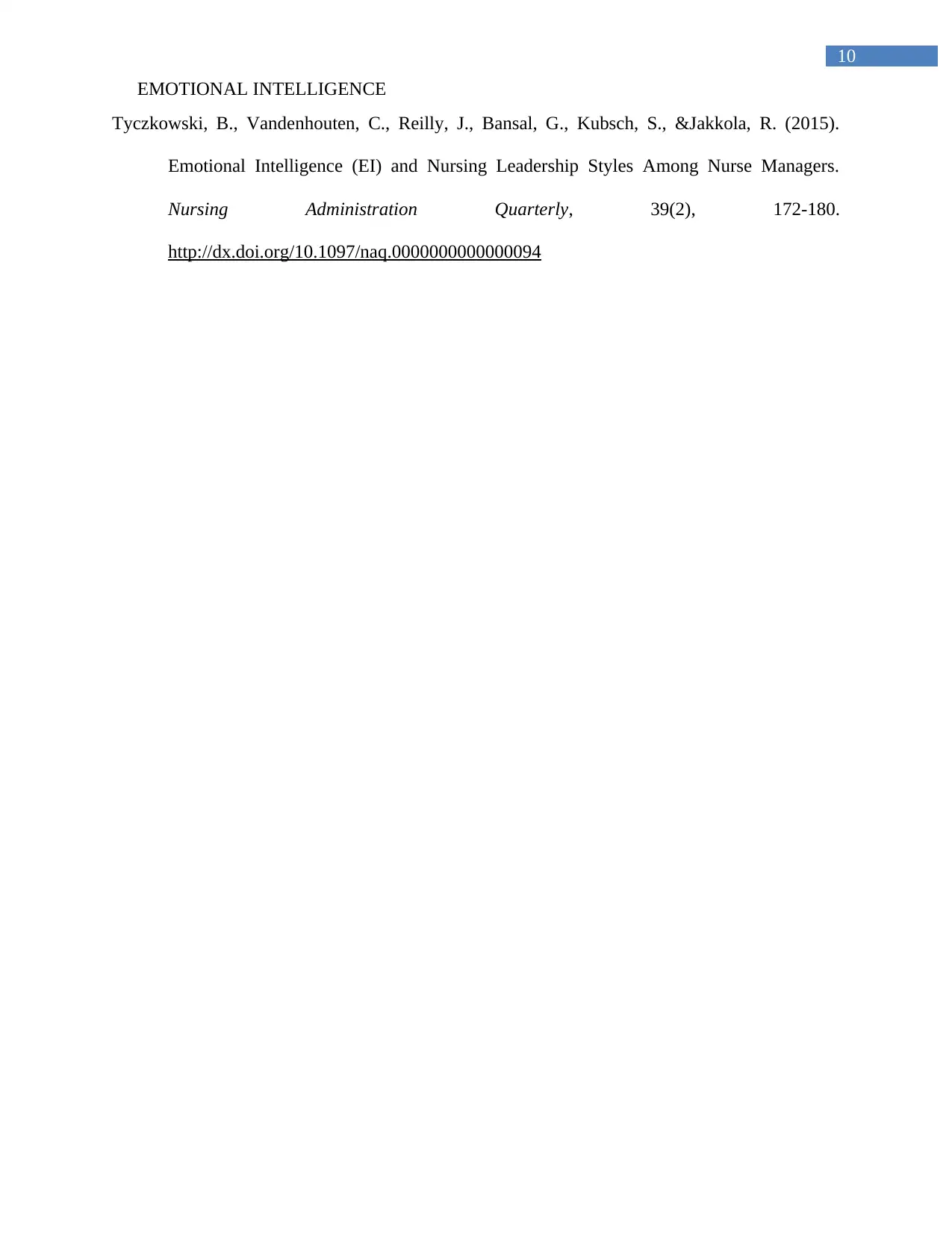
10
EMOTIONAL INTELLIGENCE
Tyczkowski, B., Vandenhouten, C., Reilly, J., Bansal, G., Kubsch, S., &Jakkola, R. (2015).
Emotional Intelligence (EI) and Nursing Leadership Styles Among Nurse Managers.
Nursing Administration Quarterly, 39(2), 172-180.
http://dx.doi.org/10.1097/naq.0000000000000094
EMOTIONAL INTELLIGENCE
Tyczkowski, B., Vandenhouten, C., Reilly, J., Bansal, G., Kubsch, S., &Jakkola, R. (2015).
Emotional Intelligence (EI) and Nursing Leadership Styles Among Nurse Managers.
Nursing Administration Quarterly, 39(2), 172-180.
http://dx.doi.org/10.1097/naq.0000000000000094
1 out of 11
Related Documents
Your All-in-One AI-Powered Toolkit for Academic Success.
+13062052269
info@desklib.com
Available 24*7 on WhatsApp / Email
![[object Object]](/_next/static/media/star-bottom.7253800d.svg)
Unlock your academic potential
© 2024 | Zucol Services PVT LTD | All rights reserved.




